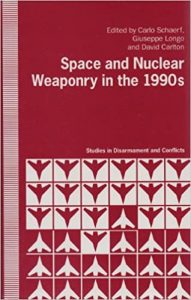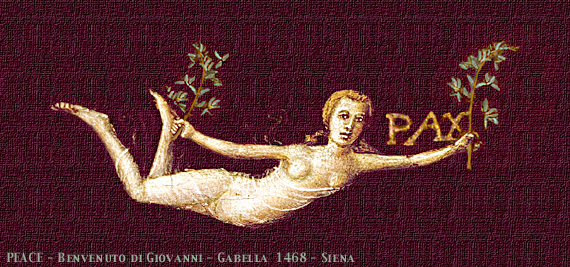FOLGARIA (Trento) 1990, BEIJING (China) 1990, L’AQUILA 1990, BOLOGNA 1990
Edited by Carlo Schaerf, Giuseppe Longo, David Carlton
Published by Macmillan (London) and St. Martin’s Press (New York), 1992
205 pages
ISBN 0333567781

Preface
List of Abbreviations
Notes on the Contributors
PART I SPACE WEAPONRY
The Present Status of the Strategic Defense Initiative
Dietrich Schroeer
Introduction
Funding Patterns
SDI Weapons Developments
Feasibility of Strategic Defences
Current Systems Plans
Effects of SDI Results on SDI Programmes
SDI and Strategic-defence Options
SDI Spin-offs
Conclusions
Banning ASAT Weapons
Cheng Dongquan and Huang Zhen
Introduction
A Survey of Artificial Satellites
A Survey of ASAT Weapons
Relations between Satellites and ASAT Weapons
Banning Strategic Defence Systems
Proposals
Monitoring and Regulating Dangerous Space Activities
Paolo Farinella and Luciano Anselmo
Introduction
The Future of Space Activities
Nuclear Power Systems in Space
Space Debris
Uncontrolled Re-entries
Current Surveillance of Space Activities
An International Agency to Monitor Space Activities
Conclusions
The Technical Basis for Bans on Space Nuclear Reactors and Ground-based Anti-satellite Lasers
Frank von Hippel
Introduction
A Ban on Nuclear Reactors in Earth Orbit
A Ban on Laser ASATS
Conclusion
PART II NUCLEAR WEAPONRY
Arms Control and Arsenal Reductions: An Overview
Yuri Pinchukov
Introduction
Key Elements of the Emerging START Treaty
Nuclear Testing
Reflections on the Non-proliferation of Nuclear Weapons
Pan Zhenqiang
The Present Status Quo of the Non-proliferation
Regime
Prospects
The Direction of New Efforts
China and the Non-proliferation Regime
Not What the Strategists had in Mind: Arms Control and American Security
Michael Nacht
Introduction
What is Arms Control and Who Says So?
Personalities, Domestic Politics and the Sense of History
China and START
Liu Huaqiu
Nuclear Weapons in the Mediterranean
Giuseppe Longo
Nuclear Weapons at Sea and the Arms Limitation and Reduction Talks
Nuclear Weapons in the Mediterranean: Threats to Peace and to the Environment
Proposals for Reducing Naval Nuclear Weapons
Nuclear Test Moratoria, Test Bans and the Non-proliferation Treaty
Gerald W.Johnson
A Feasible Way Towards a Comprehensive Test Ban
Hu Side and Liu Gongliang
Nuclear Tests and the Arms Race
A Historical Review and Evaluation of Negotiations for a Nuclear Test Ban
Obstacles to a Comprehensive Test Ban
A Feasible Way Towards a CTB
On-site Inspection for Compliance with Treaties
David W. Dorn
Introduction
History
Types of OSI
Benefits and Risks
Conclusion
The Hidden Costs of Arms Control
Dorinda G. Dallmeyer
Introduction
The INF Inspection Regime
The Demand for “Effective Verification”
The INF Experience
Monitoring Compliance with Limits on Strategic Weapons
Costs of Monitoring Compliance with START
Conclusions
Index
Luciano Anselmo (Italian) is on the Research Staff of the Spaceflight Dynamics Section of the National Computing Centre of the Italian Research Council in Pisa. He has been involved in supporting several space missions.
David Carlton (British) (co-editor) is Lecturer in International Studies at the University of Warwick. He is author of Anthony Eden: A Biography and of Britain and the Suez Crisis. He is co-editor of eleven previous volumes in this series.
Cheng Dongquan (Chinese) is a Professor at the Institute of Applied Physics and Computational Mathematics in Beijing. He is currently engaged in studies of laser theory.
Dorinda G. Dallmeyer (US) is Research Director at the Dean Rusk Center for International Comparative Law, University of Georgia, Athens, Georgia. She is editor of The Strategie Defense Initiative: New Perspectives on Deterrence.
David W. Doro (US) is Principal Deputy on the Treaty Verification Pro gram of the Lawrence Livermore National Laboratory. He has served as Advisor to the US Department of Energy and as a US Delegate to the Conference on Disarmament.
Paolo Farinella (Italian) is a Researcher in Astrophysics and Celestial Mechanics at the University of Pisa. He is co-author of a report on alternative defence concepts and the role of Italy commissioned by the Italian Ministry of Defence.
Huang Zhen (Chinese) is a staff member of the Chinese People’s Association for Peace and Disarmament. She was awarded a Bachelor of Arts degree by Anhui University in 1985.
Hu Side (Chinese) is Deputy Director of the Institute of Applied Physics and Computational Mathematics in Beijing. Professor Hu is a specialist on problems of verification.
Gerald W. Johnson (US) is an Adjunct Professor at the University of California’s Institute on Global Conflict and Cooperation. He was formerly Associate Director for nuclear-weapon testing at Lawrence Livermore National Laboratory.
Liu Gongliang (Chinese) is a Professor at the Institute of Applied Physics and Computational Mathematics in Beijing.
Liu Huaqiu (Chinese) is a Senior Fellow on the Commission on Science, Technology and Industry for National Defence in Beijing. He is author of China and the Neutron Bomb (1988).
Giuseppe Longo (Italian) (co-editor) is Professor of Physics at the University of Bologna. He is also a member of the Executive Board of the university’s interdepartmental Research Centre for Peace.
Michael Nacht (US) is Professor of Public Policy and Dean of the School of Public Affairs at the University of Maryland. He was previously Associate Director of the Center for Science and International Affairs at Harvard University. He was founding co-editor of International Security.
Pan Zhenqiang (Chinese) is Deputy Director of the Institute for Strategie Studies at the National Defence University in Beijing.
Yuri Pinchukov (Soviet) is Head of the Section of General Problems of Disarmament at the Institute of World Economy and International Relations in Moscow. He formerly conducted research at the Kurchatov Institute of Atomic Energy and at the Space Research Institute of the Soviet Academy of Sciences.
Carlo Schaerf (Italian) (co-editor) is Professor of Physics at the second University of Rome, ‘Tor Vergata’. He was previously on the staff of the Italian Atomic Energy Commission. With Professor Edoardo Amaldi he founded in 1966 the International School on Disarmament and Research on Conflicts. He is co-editor of eleven previous volumes in this series.
Dietrich Schroeer (US) is Professor of Physics in the Department of Physics and Astronomy at the University of North Carolina, Chapel Hill. He is author of Science, Technology and the Nuclear Arms Race (1984). He is author of Science, Technology and the Nuclear Arms Race (1984).
Frank von Rippel (US) is Professor of Public and International Affairs at Princeton University. He is Chairman of the Board of Editors of Science and Global Security.

